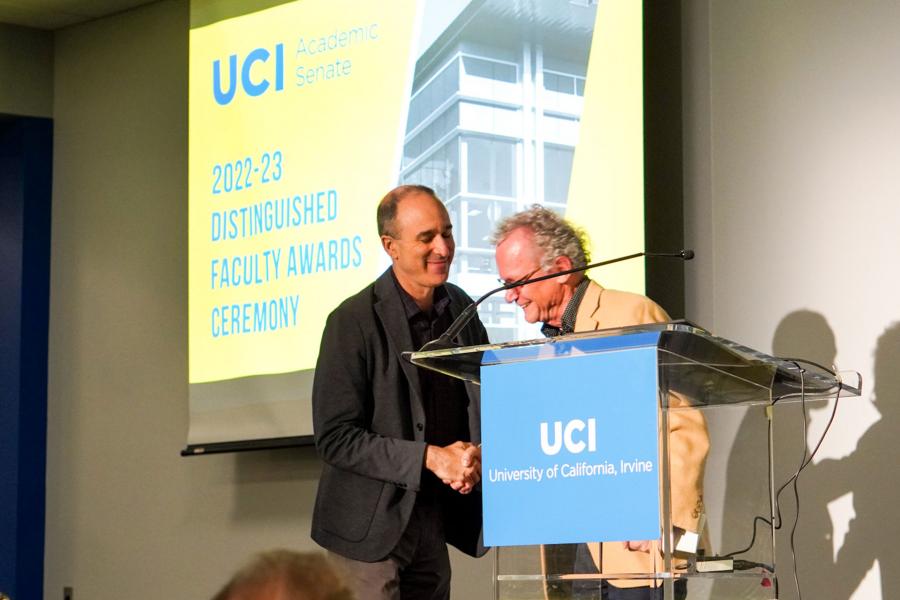UCI Academic Senate Honors Music Professor Michael Dessen
The UCI Academic Senate recently presented the 2022-23 Distinguished Faculty Awards, the Senate's highest honors, to recognize the achievements of its members in research, teaching, mentorship, and service. The recipients were selected by the Committee on Scholarly Honors and Awards.
Among the awardees was Michael Dessen, professor at UCI Claire Trevor School of the Arts Department of Music, who received the Distinguished Faculty Award for Teaching Professor. The ceremony took place on Wednesday, March 1, 2023, at the Newkirk Alumni Center.
Georg Striedter, academic senate chair and professor of neurobiology and behavior in the School of Biological Sciences, presented the welcome remarks for the event. The ceremony also included a keynote presentation by Roxanne Cohen Silver, the Distinguished Senior Faculty Award for Research recipient, entitled "Coping with Collective Traumas: From Mass Violence to COVID-19." Provost and Executive Vice Chancellor, Hal Stern, delivered the closing remarks.
UCI Claire Trevor School of the Arts congratulates all the recipients on their outstanding achievements and contributions to their respective fields.
Top Image: Professor Michael Dessen receives his award from Professor Georg Striedter at the Newkirk Center. (Photo by Christine Parales Porciuncula)
In His Own Words, Professor Michael Dessen
From early childhood, I felt a visceral connection with music, first learning by ear in family settings, and later immersing myself in trombone performance and European classical music. While deepening those studies at a conservatory, my experiences with peers outside the classroom expanded my musical worlds, and by the time I graduated, I was fascinated with composition, improvisation, jazz, salsa, electronics, experimental and avant-garde musics, Indian music, West African music - the list was endless.
Feeling that vastness, I had no interest in specialized graduate programs and avoided them for years, until one day when I learned that composer- saxophonist Yusef Lateef was teaching in a master’s program at a nearby university. I jumped at the chance to study with him. An iconic figure in jazz who refused to use that word, Lateef profoundly influenced me through his ability to integrate divergent ideas and practices in a highly individual way. Witnessing his status as an under-valued adjunct instructor also opened my eyes to the stakes of inclusion in academic institutions.
I was soon drawn to UC San Diego by the chance to study in a new Ph.D. program called Critical Studies and Experimental Practices with George E. Lewis and Anthony Davis, two other innovative Black American composer-improvisers who had an equally deep impact on me. There, I was introduced to a wide range of theoretical scholarship and musical practices, including the legacies of "creative music," a term used by African American musicians in the 1960s and ‘70s to articulate an interwoven sense of artistic mobility and political agency. In parallel, I composed and performed my own music with a growing network of collaborators, and also spent endless nights freelancing in bars and weddings with diverse bands to supplement my income.
All those experiences expanded my perspective again, but not only through new sounds: I was also pushed to confront new ways of thinking about the cultural work that music does in the world, including how music making is mediated by race, gender, and class. That critical training helped ground my emerging professional values, and also gave me richer tools for understanding my life experiences, which include growing up in the south in the aftermath of the Civil Rights Movement as a white person, and falling in love with a Venezuelan artist and being part of her Latin American immigrant family for 30 years.
As a composer-improviser, trombonist, and technologist, I create highly interactive, improvisatory music inspired especially by "jazz" and adjacent traditions, and I also explore the potentials of telematic/networked music performance and other real-time technologies. My writing and teaching interests grow from the ethical and poetic implications of those artistic practices and the communities surrounding them. In recent years, I have also focused on working with youth in ways inspired by Connected Learning frameworks, particularly as co-director of Telematic Bridges/Puentes Telemáticos, an intercultural, telepresent music program that connects music students from Santa Ana High School with peers in Manizales, Colombia.
I joined the UCI faculty in 2006, and immediately collaborated with several colleagues to design a new M.F.A. (now Ph.D.) program called Integrated Composition, Improvisation and Technology (ICIT), seeking together to animate the field with new models of graduate music training. Helping grow ICIT has been a joyful, ongoing learning experience, and the same is true of my undergraduate teaching, where I offer courses on a variety of topics for both music majors and GE students. Working at UCI is truly a privilege, and I am extremely grateful to receive this teaching award.

